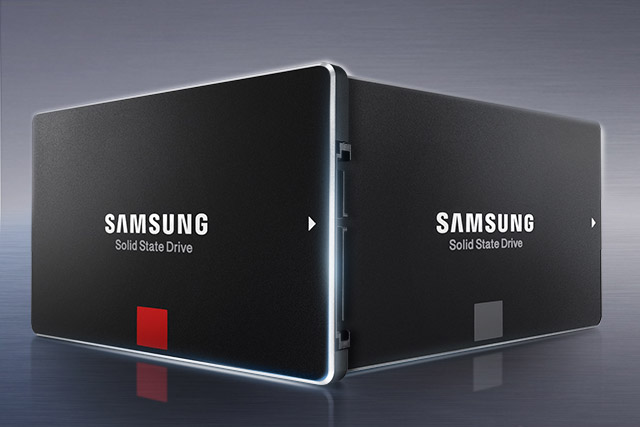
The new SM961 and PM961 SSDs will be based on 3D/V-NAND memory, although the company is currently remaining silent regarding the use of third-generation V-NAND (48-layer) or second-generation V-NAND (32-layer). The drives will also be offered in an M.2-2280 form factor and utilize a PCIe 3.0 x4 interface, according to PC Watch (translated via AnandTech).
Based on provided screenshots taken at the Samsung event, the PM961 will be offered in 128GB, 256GB, 512GB, and 1TB capacities. Sequential read speeds are supposedly up to 3,000 MB/s, while sequential write speeds are up to 1,150 MB/s. Additionally, random read speeds are up to 360K IOPS, whereas the random write speeds reach up to 280K IOPS. This model, based on 3D/V-NAND in MLC mode, should be a more affordable option when compared to Samsung’s other model showcased at the show.
That said, the SM961 seems to be a meatier storage solution. This M.2 SSD will be provided in 128GB, 256GB, 512GB, and 1TB capacities, with sequential reads speeds up to 3,200 MB/s and sequential write speeds up to 1,800 MB/s. On the random read front, this model is capable of up to 450K IOPS and up to 400K IOPS random write speeds. The SM961, based on 3D/V-NAND in TLC mode, may be offered in servers where speed is the upmost importance.
At this time, Samsung has yet to formally introduce the SM961 and the PM961, but PC Watch indicates that the company will likely offer these products to OEMs for use in machines released in the second half of 2016. Even more, the fact that these two SSDs feature serial numbers, certification stamps, and labels means there’s a good chance Samsung is about to wrap up development.
The new Samsung Polaris controller follows the Samsung UBX chip, which was used in SSDs such as the 950 Pro, the SM951-NVMe solution for OEMs, and the SM953. The 950 Pro, released in September 2015, was actually Samsung’s first consumer SSD to cram its V-NAND technology and NVMe protocol support together into one product. The included Samsung UBX controller had three ARM Cortex-R4 cores clocked at 500MHz, two less cores than what’s provided in the new Samsung Polaris solution.
In addition to the SM961 and PM961 SSDs, Samsung also demonstrated during its Japan event new SSDs based on the Maia controller. The Maia chip is capable of supporting multiple NAND flash memory types including 3D/V-NAND and MLC, and is intended to be used in OEM-focused SSDs with a SATA interface. For this specific demonstration, the SSDs utilized a 2.5-inch form factor and were equipped with SATA 3 (6Gbps) interfaces. Possibly aimed at the low-end market, CM871a was listed to provide 128GB and 256GB capacities whereas the PM871a was listed to offer 128GB, 256GB, 512GB, and 1TB capacities.

